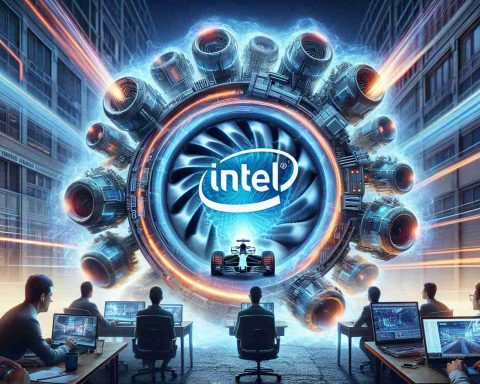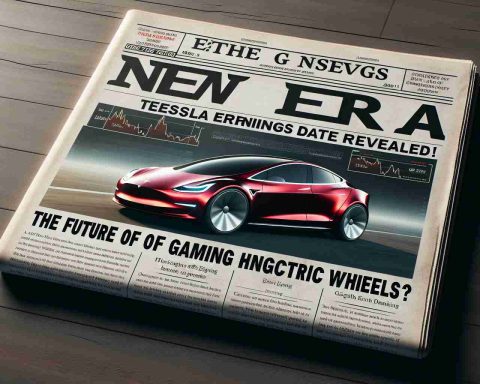Nvidia Responds to AI Chip Regulations
In a bold move, Nvidia has publicly criticized the Biden administration for its recent restrictions on artificial intelligence chip exports, labeling these measures as “misguided.” The company claims that these regulations could hinder innovation and impede the growth of the tech industry in the United States.
Amid the debate on AI technology and national security concerns, Nvidia’s executives have expressed their belief that regulation should support advancement, not stifle it. The firm argues that under the previous Trump administration, policies were more conducive to fostering technological progress, allowing companies to push boundaries within the industry.
Nvidia’s position highlights a growing tension between tech giants and government regulators. As the demand for powerful AI technology skyrockets, the company asserts that excessive restrictions could give a competitive edge to overseas firms, particularly in rapidly evolving markets. The firm emphasizes that collaboration, rather than confinement, could lead to stronger security and development in AI.
These remarks come at a crucial time as the industry faces a pivotal moment in balancing innovation with regulation. Nvidia’s strong stance indicates that they will continue to advocate for policies that promote rather than limit technological advancement as the future of AI hangs in the balance.
Nvidia Responds to AI Chip Regulations
In a notable response to recent government regulatory measures, Nvidia has spoken out against the Biden administration’s new restrictions on artificial intelligence chip exports. The company has described these regulations as “misguided,” arguing that they pose risks not just to innovation, but also to the broader technology sector’s growth in the United States. This development ignites an essential debate about the intersection of technology, governance, and the future of innovation.
The crux of Nvidia’s argument centers around the belief that regulatory measures should encourage technological advancement rather than obstruct it. The company reflects on a time under the previous administration when policies purportedly allowed tech firms to innovate freely without stringent constraints. As the demand for sophisticated AI hardware continues to rise, Nvidia warns that excessive regulations could inadvertently bolster international competitors, particularly those in rapidly advancing markets such as China.
Nvidia’s position paints a picture of a tech industry at a crossroads, facing the delicate task of balancing revolutionary innovation with the pressing need for responsible regulation. Historically, tensions between regulatory frameworks and technological advancement have shaped the landscape of many industries. In the case of AI, an area poised to disrupt numerous facets of daily life—from personal assistants to autonomous vehicles—the outcome of such regulatory efforts will have significant ramifications for humanity.
## Environmental, Economic, and Global Impact
The implications of AI chip regulations extend beyond the tech industry, influencing the environment, economy, and even global power dynamics. For instance, the development and deployment of AI technologies have the potential to optimize resource consumption, mitigate waste, and enhance efficiencies in sectors such as agriculture and energy. By stifling AI chip innovation, the government risks delaying advancements that could contribute to environmental sustainability. Companies using AI can optimize energy usage in data centers, reduce emissions in transportation, and improve crop yields—all of which are vital in addressing climate change.
On the economic front, a slowdown in AI chip production may hinder job creation and economic growth. The tech sector has seen rapid job expansion fueled by AI advancements and the demand for skilled labor in this area. If U.S. companies fall behind due to restrictive regulations, it could result in a talent exodus to countries with fewer barriers, diminishing local job opportunities and weakening the economy. Additionally, the technology sector has been a significant driver of U.S. exports. A decline in competitiveness could lead to a trade imbalance as international firms become leaders in AI development.
Globally, the battle over AI technology creates an environment of competitive nationalism. As the U.S. pushes for regulation, countries like China may exploit this opportunity to become the leaders in the AI field. This dynamic can alter geopolitical power structures, making technological supremacy essential for national security and international influence. Countries that invest heavily in AI technology will likely accrue significant advantages, leading to power shifts on the global stage.
## The Future of Humanity
As we consider the future of humanity, the growing role of AI technology is undeniable. From enhancing healthcare through predictive analytics to transforming transportation with autonomous vehicles, the potential benefits are immense. However, the pathway to realizing these benefits is paved with challenges—chief among them, the need to regulate without stifling progress.
The relationship between government oversight and technology innovation will play a critical role in shaping futures. Striking the right balance will require ongoing dialogue between tech leaders, policymakers, and society at large. As industries continue to evolve and integrate technologies that reshape the fabric of everyday life, a collaborative approach may emerge as imperative for fostering responsible innovation that protects and enhances the world we inhabit.
Thus, Nvidia’s stance on AI chip regulations is not merely about business interests; it reflects broader implications for environmental sustainability, economic vitality, and the geopolitical landscape of the future. The choices made today in regulating technology will inevitably influence the trajectory of humanity and our relationship with the advancements we create.
Nvidia’s Bold Stand: How New AI Chip Regulations Could Shape the Future
Nvidia’s Critique of AI Chip Regulations
Nvidia has recently made headlines by challenging the Biden administration’s export restrictions on artificial intelligence (AI) chips, arguing that these regulations are not only counterproductive but also potentially damaging to innovation within the tech sector in the United States. With the increasing demand for AI technologies, Nvidia’s response brings to light significant aspects of the ongoing debate over national security and technological leadership.
Insights from Nvidia’s Executives
Nvidia executives voiced their concerns during industry discussions, asserting that these regulations risk placing U.S. companies at a disadvantage compared to competitors in countries without such stringent export controls. They advocate for a more balanced approach towards regulation—one that encourages growth rather than restricts it. This stance suggests a pressing need for policies that both ensure security and foster competitive technological development.
The Competitive Landscape
As global competition intensifies, Nvidia warns that excessive export restrictions may lead to a fragmentation of AI innovation and development. The fear is that companies in countries with fewer regulations could leverage this gap, potentially leading to a loss of technological leadership for the U.S. This angle introduces a critical aspect of the broader discussion on how regulations affect not just national security but also the economic implications and the dynamics of global competitiveness.
Pros and Cons of Current Regulations
# Pros:
– National Security: Proponents argue that these regulations are essential for safeguarding sensitive technologies from adversaries.
– Technological Accountability: Regulations may ensure that advancements align with ethical considerations and societal values.
# Cons:
– Stifled Innovation: Critics, including Nvidia, contend that such measures can hinder the rapid progression of technology and reduce the U.S.’s competitive edge.
– Market Disruption: Tight restrictions can result in established players losing ground to international competitors who are less encumbered by such limitations.
Innovations and Trends in AI Technology
As AI technology evolves, so too do the capabilities and applications of AI chips. Nvidia, with its focus on cutting-edge developments in graphics processing units (GPUs) designed for AI applications, plays a pivotal role in shaping trends. Their advancements include:
– AI-Enhanced Graphics: Nvidia’s AI chips are setting new standards in graphics performance, impacting gaming, film production, and virtual reality.
– Machine Learning Acceleration: Innovative architectures within their chips significantly enhance machine learning capabilities, which could be crucial for industries such as healthcare and autonomous driving.
Limitations and Challenges
Despite its robust portfolio, Nvidia faces challenges in navigating regulatory landscapes. Emerging limitations can include:
– Compliance Costs: Adapting to new regulations may result in increased operational costs for Nvidia and similar firms.
– Geopolitical Risks: International trade relations can further complicate the global sourcing of materials and collaborative projects in AI research.
Future Predictions for Nvidia and AI Regulations
Moving forward, the tech industry is expected to continue grappling with the consequences of AI regulations. Predictions indicate that companies like Nvidia will likely increase their lobbying efforts to advocate for policies that support innovation while maintaining security standards. Furthermore, as AI technologies penetrate various sectors, regulatory frameworks may evolve, potentially leading to more adaptive and nuanced approaches to governance.
Conclusion
The discourse surrounding AI chip regulation is emblematic of a larger tension between technological advancement and governmental oversight. Nvidia’s public response marks a pivotal moment in which tech giants may increasingly assert their influence in policy discussions. As the industry continues to grow, finding a balance between innovation, competition, and security will be paramount.
For more insights into the future of AI technology and market dynamics, visit Nvidia’s official site.


















